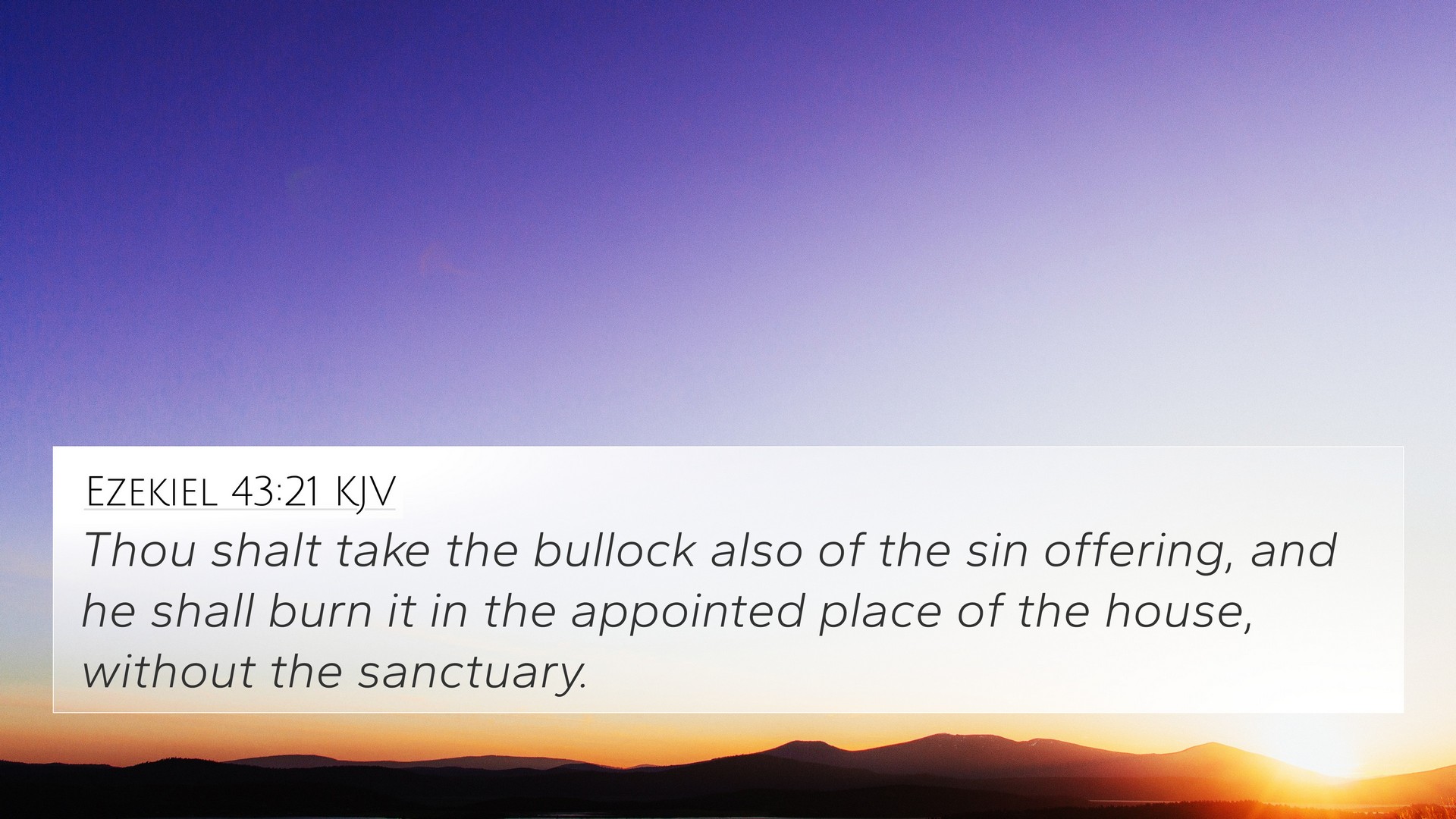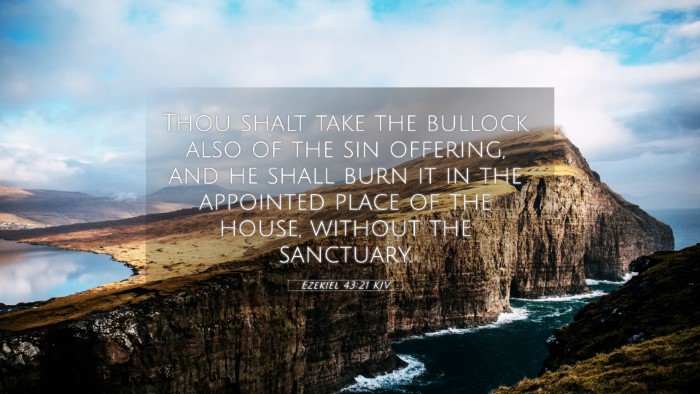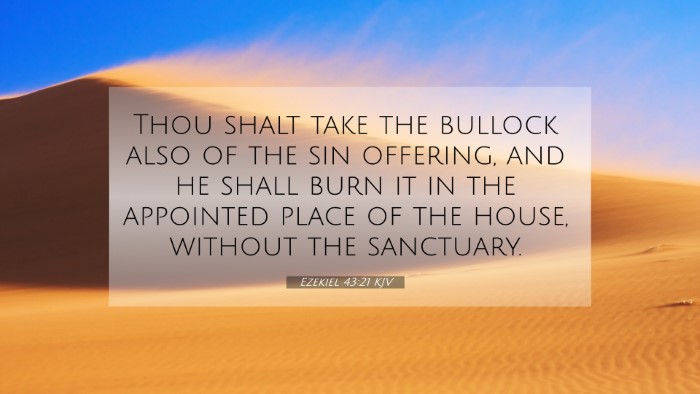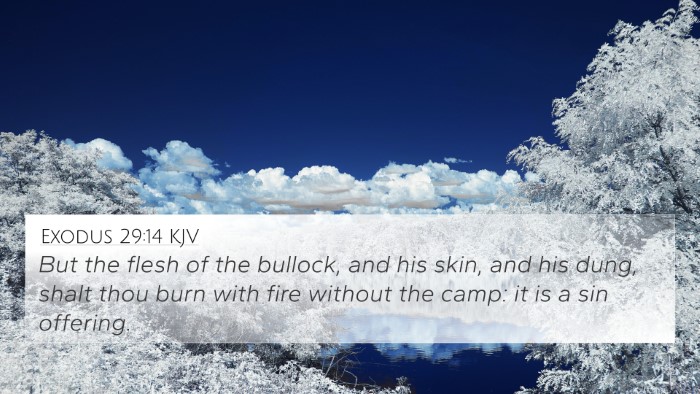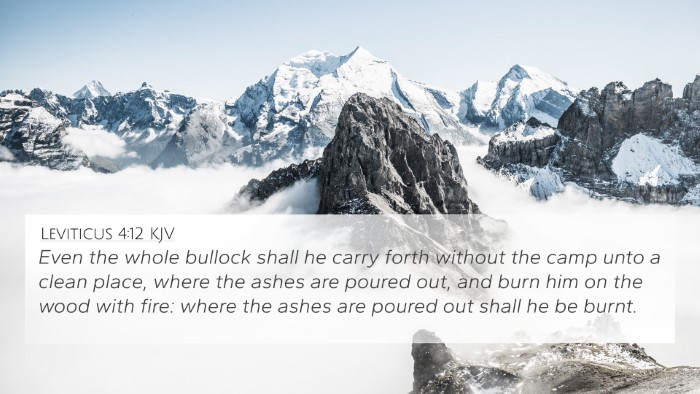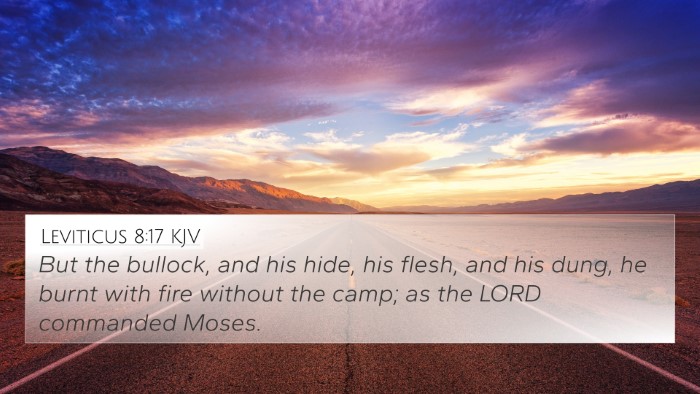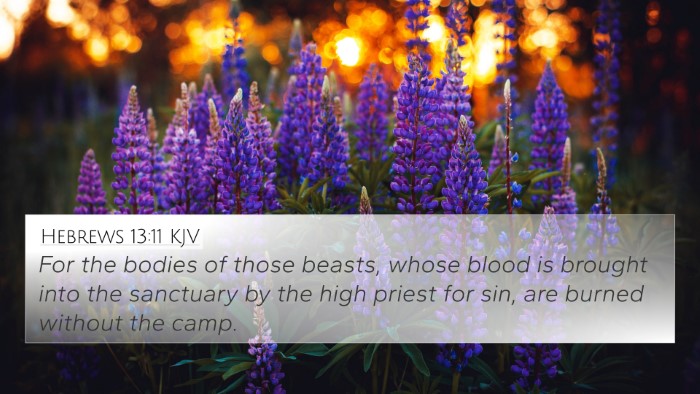Ezekiel 43:21 Explained
Bible Verse: Ezekiel 43:21
“And thou shalt take the blood of it, and put it upon the four corners of the altar, and upon the four horns of the altar, and upon the bottom of the altar: and thou shalt cleanse it, and purge it from sin.”
Meaning and Interpretation
This verse captures a significant action in the rituals of the sacrificial system as explained in the Book of Ezekiel. Let’s explore its meaning by synthesizing insights from respected public domain commentaries.
Insights from Commentaries
- Matthew Henry: Henry emphasizes the importance of the blood in the atonement process. He illustrates how the act of placing blood on the altar signifies the cleansing of sin and God's provision for purification.
- Albert Barnes: Barnes provides a reflection on the physical act of sacrificing and its spiritual implications. He speaks of the significance of the four corners and horns as representing the totality of sin being addressed, denoting completeness in atonement.
- Adam Clarke: Clarke highlights the detailed instructions given by God to Ezekiel, demonstrating precision in ritual practices. He explains that the altar is a type of Christ, whose sacrifice covers sins, linking to New Testament themes of redemption.
Thematic Connections
The act described in Ezekiel 43:21 not only brings forth a ritual cleansing but also has broader implications within biblical theology as it sets foundational perspectives on worship and redemption.
1. The Significance of Blood
Blood symbolizes life and is central to the sacrificial system instituted by God. Cross-referencing this with Hebrews 9:22, which states, "without the shedding of blood, there is no remission," reinforces this idea of atonement.
2. Representing Covenant
In Exodus 24:8, we read about Moses taking the blood of the covenant. By paralleling these verses, we see how blood signifies the sealing of covenants between God and His people.
3. Complete Atonement
The four corners and horns are crucial for illustrating complete coverage. This relates to 1 John 1:7, which assures believers that the blood of Jesus cleanses us from all sin, linking Old Testament practices and New Testament fulfillment.
4. Purification and Holiness
In Ezekiel's context, the altar become a symbol of holiness, much as seen in Leviticus 16:30, which discusses atonement and cleansing from sin, reinforcing the theme of divine purification.
5. The Role of the Altar
The altar serves as the central place of worship. This concept resonates with Matthew 5:23-24, where Jesus speaks about the importance of reconciliation at the altar.
6. Modality of Worship
Understanding the proper approach to worship aligns with Romans 12:1, where Paul urges believers to present their bodies as living sacrifices, suggesting a transformation of worship from the physical to spiritual.
7. God's Demand for Holiness
Through rituals depicted in Ezekiel, God demands a clear manifestation of holiness as stressed in 1 Peter 1:16, “Be holy, for I am holy,” tying the Old Covenant’s call for holiness with New Covenant exhortation.
Cross-References
Here are some Bible verses that relate significantly to Ezekiel 43:21, showing connections and thematic relationships:
- Leviticus 16:30 - The day of atonement and the call for purification.
- Hebrews 9:22 - The necessity of blood for remission of sins.
- 1 John 1:7 - Cleansing from all sins through the blood of Jesus.
- Matthew 5:23-24 - Reconciliation at the altar before offerings.
- Exodus 24:8 - The blood of the covenant and its significance.
- Romans 12:1 - Living sacrifices and spiritual worship.
- 1 Peter 1:16 - The call to holiness.
Understanding through Cross-Referencing
This inter-Biblical dialogue serves to deepen our understanding of the sacredness of rituals, the symbolic nature of blood, and the overarching theme of atonement which culminates in the New Testament's unfolding revelation of Christ.
Tools for Bible Cross-Referencing
To further explore the connections between Bible verses, one may utilize resources such as a Bible concordance, Bible cross-reference guide, and other Bible reference resources designed for detailed study.
Conclusion
Ezekiel 43:21 serves as both a historical record and a moment of profound theological significance, intertwining the themes of atonement, purification, and the holiness of God. By engaging in cross-referencing Biblical texts, we can uncover deeper insights and connections that enrich our understanding of Scripture.
